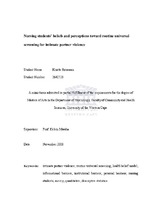| dc.description.abstract | Intimate partner violence (IPV) has reached epidemic proportions in South Africa, prompting the government to pass the Domestic Violence Act 116 (1998). However, numerous scholars still believe that legislation is lacking due to inadequate implementation of protocol in the healthcare sector. In the healthcare setting, nurses are usually the first people that abused women make contact with and so they are in an excellent position to identify IPV victims and prevent further abuse. Routine universal screening in the healthcare setting is recommended as a means to identify women who suffer in abusive relationships. However, several problems have been encountered with the attempts to implement screening practices. In this study the various perceived barriers to IPV screening among nursing students were examined by use of a descriptive survey approach. The research participants were 103 nursing students from the University of the Western Cape. Data were collected by means of a selfadministered questionnaire and analysed using descriptive as a means to uncover the relationship between perceived barriers and the screening practices of the participants. The aim of this study was to identify the barriers that will discourage a nurse from routinely screening for intimate partner violence in a healthcare practice. The present study’s results indicated that the majority of variance in routinely screening for IPV can be explained by barriers related to HCP knowledge of managing IPV disclosure;
the perceived responses of patients to screening; the privatisation of abuse; and whether HCP regard IPV as a healthcare issue. Information, regarding the beliefs of healthcare providers (HCP) with regard to IPV as well as the barriers they perceive toward screening, will be helpful in designing curricula that will successfully teach HCP how to screen for IPV and it will also be useful in making positive changes to the screening conditions in healthcare settings. | en_US |

